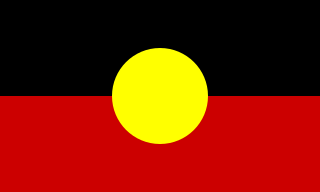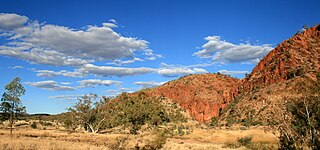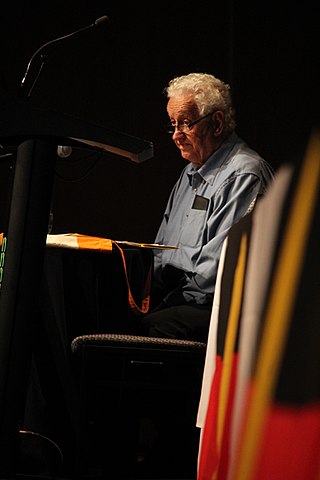Related Research Articles

The Apudthama National Park is a national park in Queensland, Australia, 2,137 km (1,328 mi) northwest of Brisbane and about 900 km (559 mi) northwest of Cairns, on the tip of Cape York Peninsula.
The Pilbara is a large, dry, thinly populated region in the north of Western Australia. It is known for its Aboriginal peoples; its ancient landscapes; the red earth; and its vast mineral deposits, in particular iron ore. It is also a global biodiversity hotspot for subterranean fauna.

The Eora are an Aboriginal Australian people of New South Wales. Eora is the name given by the earliest European settlers to a group of Aboriginal people belonging to the clans along the coastal area of what is now known as the Sydney basin, in New South Wales, Australia. The Eora share a language with the Darug people, whose traditional lands lie further inland, to the west of the Eora.

Aboriginal Australians are the various Indigenous peoples of the Australian mainland and many of its islands, excluding the ethnically distinct people of the Torres Strait Islands.

The Gamilaraay or Kamilaroi language is a Pama–Nyungan language of the Wiradhuric subgroup found mostly in south-eastern Australia. It is the traditional language of the Gamilaraay (Kamilaroi), an Aboriginal Australian people. It has been noted as endangered, but the number of speakers grew from 87 in the 2011 Australian Census to 105 in the 2016 Australian Census. Thousands of Australians identify as Gamilaraay, and the language is taught in some schools.

Anindilyakwa is an Australian Aboriginal language spoken by the Anindilyakwa people on Groote Eylandt and Bickerton Island in the Gulf of Carpentaria in the Northern Territory of Australia. Anindilyakwa is a multiple-classifying prefixing language in which all traditional nouns, adjectives, personal and demonstrative pronouns are prefixed for person, number and gender. According to the 2021 Australian Census, Anindilyakwa was spoken natively by 1,516 people, an increase from 1,283 in 2006.

Seisia is a coastal town and a locality in the Northern Peninsula Area Region, Queensland, Australia. In the 2021 census, the locality of Seisia had a population of 293 people.

Injinoo is a coastal town in the Northern Peninsula Area Region and a locality split between Northern Peninsula Area Region and the Shire of Torres in Far North Queensland, Australia. It is on the north-western coast of Cape York Peninsula. In the 2021 census, the locality of Injinoo had a population of 498 people.

The Injinoo were an Indigenous Australian people of the Cape York Peninsula, and their name now applies to a tribal aggregation of remnants of various tribes of the Cape York Peninsula.
Ngkoth is an extinct Paman language formerly spoken on the Cape York Peninsula of Queensland, Australia, by the Winduwinda. It is unknown when it became extinct.
Luthigh is an extinct Paman language formerly spoken on the Cape York Peninsula of Queensland, Australia, by the Luthigh people. It is unknown when it became extinct. It constitutes a single language with Mpalitjanh. According to Sharp (1939), the neighboring Unjadi (Unyadi) language differed only marginally from that spoken by the Okara [Luthigh].
Kija is an Australian Aboriginal language today spoken by about 200 people, most of whom live in the region from Halls Creek to Kununurra and west to Lansdowne and Tableland Stations in Western Australia. It is a member of the Jarragan language family, a non-Pama-Nyungan family in the East Kimberleys. The Argyle Diamond Mine, on the south western corner of Lake Argyle is on the borders of Gija and Miriwoong country. The Purnululu Bungle Bungle National Park is mostly in Gija country.

Cape Grenville, is a small, east-facing promontory along the Queensland, Australia coast of Cape York Peninsula. It lies between Shelburne Bay to the north and Temple Bay to the south. The nearest significant settlement is Weipa, along the western coast of Cape York.

An Indigenous Protected Area (IPA) is a class of protected area used in Australia; each is formed by voluntary agreement with Indigenous Australians, and declared by Aboriginal Australians and Torres Strait Islander representative organisations. Each is formally recognised by the Australian Government as being part of its National Reserve System. The areas may comprise land and sea, and are managed by Indigenous groups for the conservation of biodiversity. Managing IPAs also helps to protect the cultural values of their country for future generations, and has benefits for Indigenous health, education, economic and social cohesion.

Mudburra, also spelt Mudbura, Mudbarra and other variants, and also known as Pinkangama, is an Aboriginal language of Australia.
Kukatj, also rendered Gugadj, is an extinct Paman language of the Cape York Peninsula, Queensland, Australia. The name Kalibamu has also been assigned to it, although this may be a separate dialect. It is spoken by the Kukatj people. A single speaker was last recorded in 1975.
Shelburne is a northern coastal locality in the Shire of Cook, Queensland, Australia. In the 2021 census, Shelburne had a population of 44 people.
The Wuthathi, also known as the Mutjati, are an Aboriginal Australian people of the state of Queensland. Anthropologist Norman Tindale distinguished the Mutjati from the Otati, whereas AIATSIS treats the two ethnonyms as variants related to the one ethnic group, the Wuthathi.

Terri Janke is an Indigenous Australian lawyer of Wuthathi/Meriam heritage. She is considered a leading international authority on Indigenous cultural and intellectual property (ICIP), and is the Solicitor Director of Terri Janke and Company.

Athol Kennedy Chase was an Australian anthropologist and ethnographer who undertook extensive fieldwork in Cape York Peninsula, recording and especially making a cultural record of the traditions, cultural change, and cultural continuities of the Aboriginal Peoples living at Lockhart River, Queensland including cultural mapping for the Umpila, Koko Yao, Wuthathi and Kaantju.
References
- 1 2 Ernst Kausen (2005). "Australische Sprachen" (in German).
{{cite journal}}: Cite journal requires|journal=(help) - ↑ Y10 Wuthathi at the Australian Indigenous Languages Database, Australian Institute of Aboriginal and Torres Strait Islander Studies